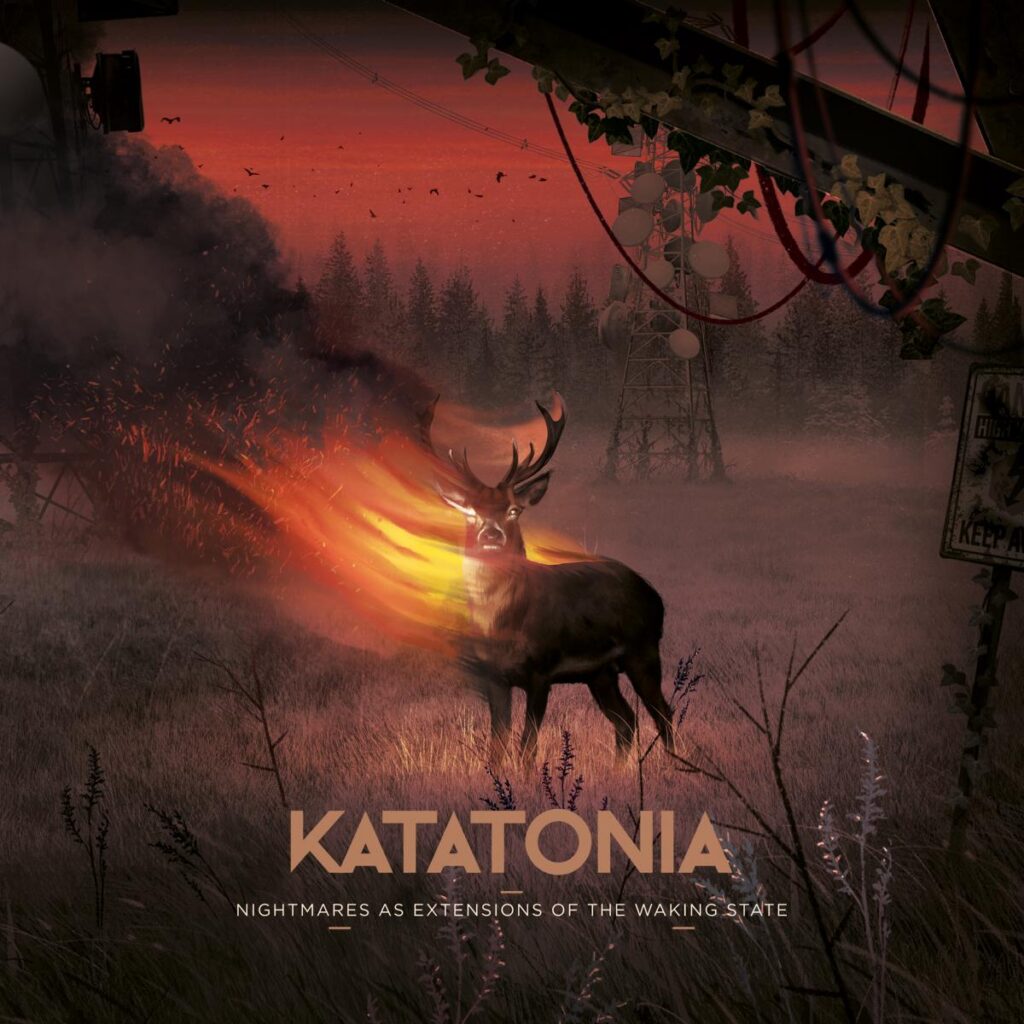
Katatonia’s twelfth album, Nightmares as Extensions of the Waking State, is as grand a piece of writing as any to which the band have lent their name. A ten-track masterclass in slow-burning intensity, it finds this most elegant of bands once more flexing their creative muscles, evolving their sound while retaining the core emotional elements that have long made them so beloved. Self-produced, with Adam Noble (Placebo) behind the mixing desk, it sounds absolutely stunning and, if the line up shifts that resulted in guitarists Nico Elgstrand and Sebastian Svalland joining the band unnerved the band any, it’s surely not visible in the final result, which sounds frankly magnificent.
The album gets off to a cracking start with the stabbing riffs and melancholy atmospheres of Thrice. Initially it feels like business as usual – the heavy riff paving the way for a more sombre approach; but the second half of the track finds the band exploring ambient textures, crunchy riffing, and syncopated rhythms with deft skill, building upon their established sound to deliver an immensely satisfying opening number in the process. As always, Jonas’ calm, multi-tracked vocal haunts the core of the track, the guitars providing a harder-edged, more metallic armour than we’ve come to expect. It’s followed by the majestic The Liquid Eye, which finds Katatonia edging into the progressive territory occupied by latter-day Opeth, while nodding to their own The Great Cold Distance in the process.
Having established the tone of the new album, the band effectively ring the changes on the eerie Wind of No Change which finds dark choirs leading the way as bassist Niklas Sandin and drummer Daniel Moilanen lay down an evil groove. An imaginative, multi-faceted piece, it showcases a confident band exploring the fringes of their sound, delivering something powerfully unique in the process. Still very much Katatonia, but unlike any Katatonia we’ve previously heard, it’s an incredibly strong song, and an album highlight. The band continue to experiment on Lilac, which is riven with ambient electronic elements, the production allowing space for the additional textures without sacrificing the intensity of the guitars. Indeed, Nico and Sebastian are on fire, deftly weaving their riffs between the different elements, always keeping the metal edge sharp, but allowing for a more evocative set of dynamics to emerge. The first half concludes with Temporal, a brooding piece that benefits from a deft arrangement that places dynamic at its heart.
The second half of the album opens with the slow-paced and rather beautiful Departure Trails, which has a whisp of Pink Floyd in its languid keyboards and liquid guitar lines. It provides a momentary reset before the taut Warden pairs lean percussive elements and stabbing bass lines to powerful effect, only allowing the guitars off the leash at around the two-minute mark. Once again, Katatonia show themselves to be masters of dynamic with this approach, the album unfolding in a leisurely fashion before the listener, steadfastly refusing to give up all its secrets at once, repaying repeat listens as a result. The band continue to evolve their musical style with the airy yet muscular The Light Which I Bleed, which finds Katatonia weaving elements of Opeth, Ulver, and even Tool into the mix with impressive results. It’s a strong song, only slightly marred by a fade out which would have been more effective had the band found a way to effectively segue it into the absolutely sublime Efter Solen. An eerie, piece that emerges from cinematic synths, it adopts a skittering, trip-hop-esque ambience that perfectly suits the band, and it would be interesting to hear Katatonia exploring this side of their sound more on future efforts. As it is, Efter Solen is both achingly beautiful and stunningly arranged, building over the course of its five-minute runtime but never fully exploding the band’s restraint giving even greater weight to explosive finale In the Event Of… With haunting swathes of Mellotron, hulking great riffs, and a gorgeous vocal melody, it provides the album with a strong conclusion, bringing this endlessly inventive entry into Katatonia’s canon to a satisfying end.
With nearly thirty-five years behind them, Katatonia have managed to successfully develop an instantly recognisable core sound while allowing for a certain amount of evolution from album to album. Here, with Adam Noble behind the desk and incoming members Nico Elgstrand and Sebastian Svalland providing six-string fire, the band have once again advanced their sound without sacrificing the qualities that have made katatonia so special over the years. It’s a delicate balancing act, but one they pull off with aplomb – here’s to many more years. 9/10


